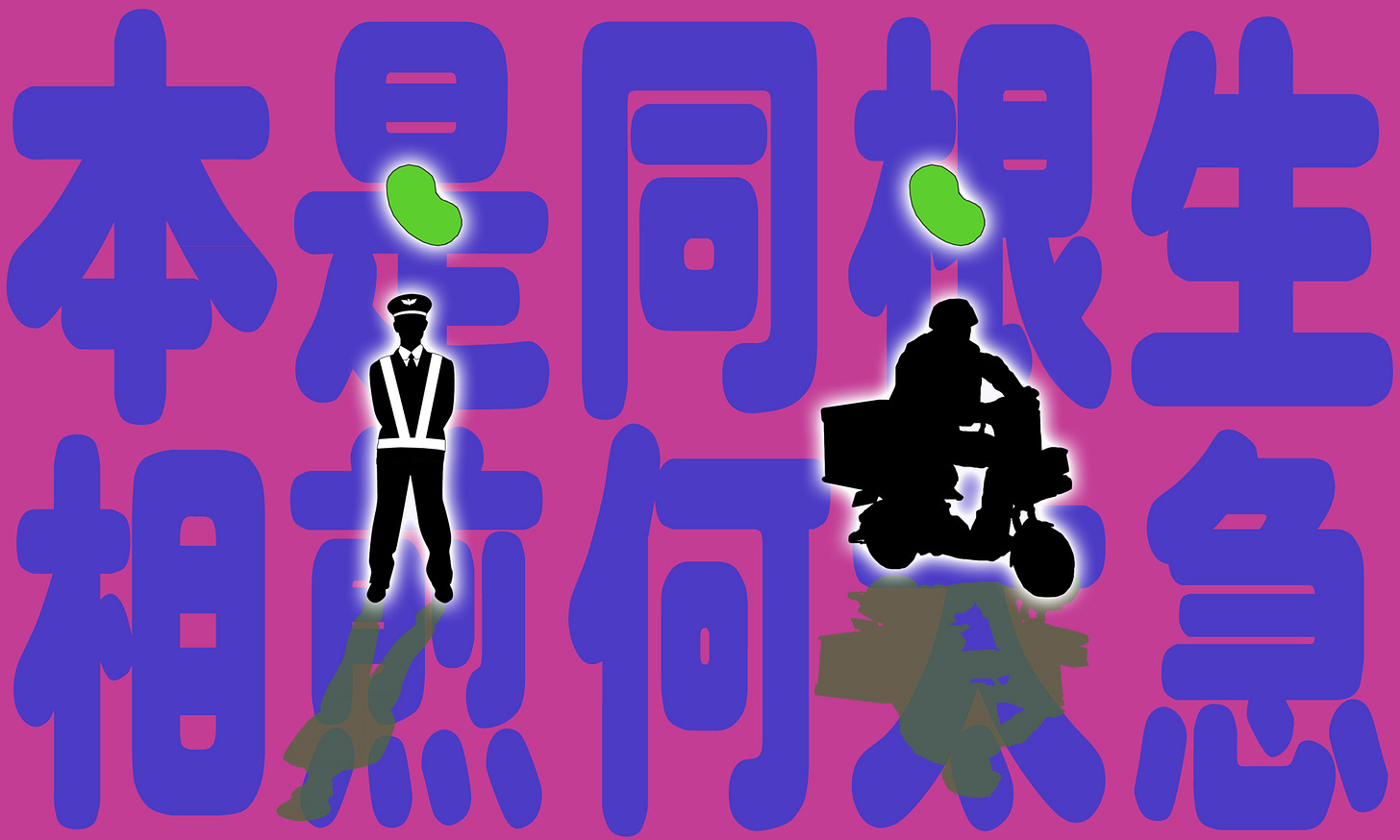"We are from the same root, why do we hurt each other?" — Phrase of the Week
The irony of the tragic death of a delivery boy killed by a security guard.
Our Phrase of the Week is: We are from the same root, why do we hurt each other? (本是同根生,相煎何太急 běn shì tóng gēn shēng, xiāng jiān hé tài jí).
The context
On the evening of December 5 at the gates of an apartment compound in the northern city of Qingdao, a dispute broke out between a security guard and a delivery rider, over whether takeout vehicles could enter the community.
The 54-year-old security guard, Zhao Li 赵力, challenged the 32-year-old delivery boy, Li Yuekai 李越凯, and refused to let him enter on his motorbike to deliver the food.
The altercation quickly escalated. In less than one minute, the older Zhao had produced a knife, and stabbed the younger delivery boy multiple times. The 32-year-old died at the scene. Zhao was arrested and faces trial for murder.
A native of Jilin province, Li Yuekai only moved to Qingdao one month earlier to help with a relative's travel business. As it was the low season, he took up food delivery as a way to make some money.
The shocking story still reverberates in the media with numerous discussions on social media.
People are asking: How can it even happen?
One opinion widely shared online is:
On the surface, this is a conflict between the security guard and the delivery man. But behind that, it reveals the rival demands from multiple parties and the entangled interests of two conflicting systems. The platform economy, represented by food delivery, pursues efficiency and profit; community governance, implemented by the security guard, pursues security and stability. Therefore, the conflict between the delivery man and the security guard is essentially a conflict between commercial needs and community safety. This tragedy of the delivery boy and the security guard made many people sigh, "You are from the same root, so why hurt each other?"
明面上只有保安和外卖员在交锋,但背后是多方诉求的冲突,和剪不断、理还乱的利益纠葛。外卖所代表的平台经济追求高效和利润,而社区治理则追求安全和稳定。所以,外卖员和保安的冲突,本质上是商业逻辑和社区治理逻辑的冲突。发生于外卖员和保安之间的这场悲剧,让不少人发出了“本是同根生,相煎何太急”的感叹。
Míngmiàn shang zhǐyǒu bǎo'ān hé wàimàiyuán zài jiāofēng, dàn bèihòu shì duōfāng sùqiú de chōngtū, hé jiǎnbúduàn, lǐháiluàn de lìyì jiūgé. Wàimài suǒ dàibiǎo de píngtái jīngjì zhuīqiú gāoxiào hé lìrùn, ér shèqū zhìlǐ zé zhuīqiú ānquán hé wěndìng. Suǒyǐ, wàimàiyuán hé bǎo'ān de chōngtū, běnzhì shang shì shāngyè luóji hé shèqū zhìlǐ luóji de chōngtū. Fāshēng yú wàimàiyuán hé bǎo'ān zhījiān de zhè chǎng bēijù, ràng bùshǎo rén fāchū le “běn shì tóng gēn shēng, xiāng jiān hé tài jí” de gǎntàn.
And with that, we have our Phrase of the Week!
What it means
This ten-character phrase translates as: “Originally born of the same root” (本是同根生 běn shì tóng gēn shēng), “why rush to hurt each other?” (相煎何太急 xiāng jiān hé tài jí).
It’s the last line from the poem, The Seven Step Verse 七步诗 qī bù shī.
The full poem is as follows:
Seven Step Verse
Boiling beans to make soup, filtering them to extract juice.
Beanstalks are burnt under the cauldron, the beans in the cauldron are wailing.
“We are from the same root, why should we burn each other to death with such impatience?”
七步诗
煮豆持作羹,漉菽以为汁。
萁在釜下燃,豆在釜中泣。
本自同根生,相煎何太急?
qī bù shī
zhǔ dòu chí zuò gēng, lù shū yǐ wéi zhī.
qí zài fǔ xià rán, dòu zài fǔ zhōng qì.
běn zì tóng gēn shēng, xiāng jiān hé tài jí?
Anyone with a high school education in China will know this poem.
According to legend, it was written by Cáo Zhí 曹植, the third son of the Warlord, Cáo Cāo 曹操, who dominated northern China towards the end of the Han dynasty.
Cao Zhi was the favoured son due to his intelligence and literary talents. But the warlord decided to make his oldest son, Cáo Pī 曹丕, heir to his throne instead.
On Cao Cao’s death in 220 AD, Cao Pi took his father’s throne. He held deep suspicion for Cao Zhi, believing he would overthrow him. So Cao Pi planned to kill Cao Zhi.
On summoning his younger brother to his court, Cao Pi gave Cao Zhi an ultimatum: Be executed, or explain within seven steps why his life should be spared.
Cao Zhi’s response was this three-line poem. The beanstalks (萁), used as fuel to heat the soup, and the beans (豆), ingredients in the soup, were a metaphor for the two brothers.
They are of the same root, so why should they fight and try to kill each other?
In the context of the tragic murder of the delivery boy at the hands of the security guard highlights the irony that they are both of the same: At the bottom of society, underprivileged, and yet they hurt each other to serve the systems that exploit them.
Andrew Methven is the author of Slow Chinese 每周漫闻, a resource to help learners of Chinese maintain and improve their language skills, and keep on top of the latest language trends in China. Read more.



